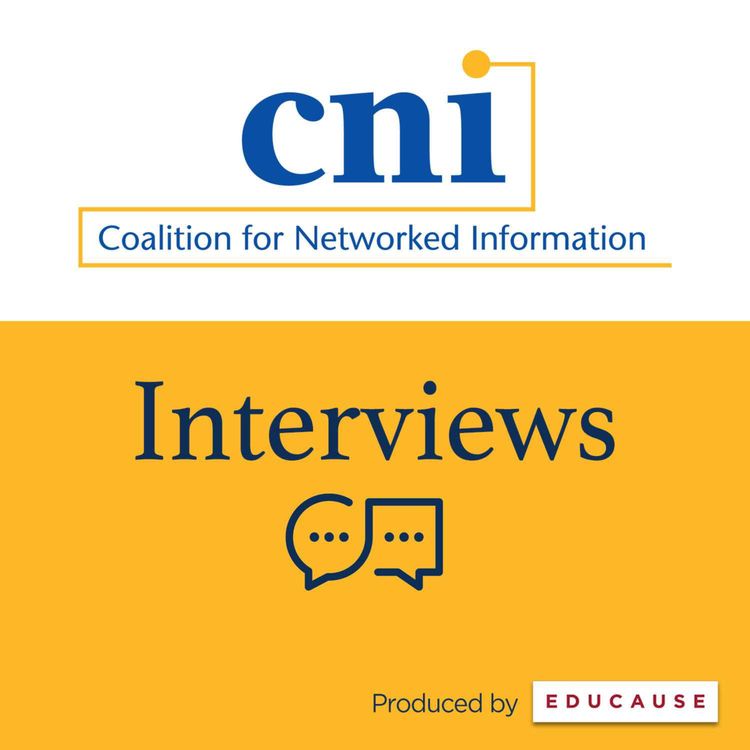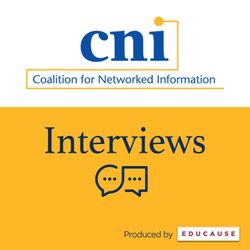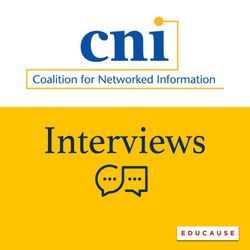Share

The CNI Interviews Podcast
Incorporating the National Research Platform at the University of Oklahoma
Season 2, Ep. 8
•
In this conversation, Mark Laufersweiler, Research Data Specialist, and Tyler Pearson, Director of Digital Scholarship and Data Services, both from the University of Oklahoma, discuss the National Research Platform (NRP), the Nautilus Project, and the Kubernetes framework. The NRP is an NSF-funded Kubernetes environment managed by the NRP. These tools were implemented at the University Libraries to help with workshops and research. A common framework for software installations will allow researchers and students to focus on the pedagogy instead of setting up work environments.
More episodes
View all episodes

6. Interview: CNI Executive Director Kate Zwaard
04:31||Season 4, Ep. 6The incoming leader of CNI shares her vision for advancing the organization’s mission and discusses the opportunities ahead at the intersection of digital information, research, and technology.
5. Libraries at Risk: Borrowed Infrastructure and Institutional Resilience
13:06||Season 4, Ep. 5Many libraries today depend on third-party platforms to store, lend, and preserve collections. In this conversation, Brewster Kahle examines how this practice undermines the role of libraries as stewards of knowledge.
4. Building The Public Interest Corpus for AI and Computational Research
11:16||Season 4, Ep. 4This episode explores an effort to create a public-interest corpus for AI training using digitized materials from research libraries, archives, and special collections. Dan Cohen, dean of the Libraries at Northeastern University, and Thomas Padilla, public interest artificial intelligence strategist for Authors Alliance, outline their goal to expand AI’s access to high-value, long-form academic content, typically absent from commercial models.
3. Access and Preservation in the Audiovisual Age
13:38||Season 4, Ep. 3Audiovisual medium is only about one hundred and thirty years old, yet it has become the mainstay of our interaction with content today. How do academic libraries and higher education institutions become effective stewards for a medium prone to erosion, playback obsolescence, and manipulation?
2. Collaboration Fuels Digital Transformation at Washington University
12:07||Season 4, Ep. 2Washington University launched the Digital Intelligence and Innovation Accelerator to drive digital transformation and support researchers. The university libraries have played a central role in connecting people and projects—including building a research chatbot, expanding access to open educational resources, and developing a campus-wide research profile system.
1. Developing AI Literacy for Faculty and Librarians
13:02||Season 4, Ep. 1Can libraries lead the way in advancing AI literacy in a rapidly evolving landscape? Leo Lo, dean and professor for the College of University Libraries and Learning Sciences at the University of New Mexico, discusses his own approach, which is grounded in interdisciplinary collaboration, pedagogy, and ethics.
3. Gathering Across Disciplines to Create Sensible Research Data Management Strategies
13:43||Season 3, Ep. 3Alison Hitchens, associate university librarian, collections, technology, scholarly communication for the University of Waterloo, helped organize a gathering of researchers, librarians, and IT professionals to discuss research data management strategies. In this interview, she talks about bringing various departments together to talk across disciplines and the benefits these conversations deliver.
2. Embedding Technology into the New Strategic Plan at the Library of Congress
33:11||Season 3, Ep. 2Judith Conklin, CIO of the Library of Congress, discusses embedding digital strategies into the Library's new strategic plan to increase accessibility and innovation. She highlights efforts to digitize the Library's collections, explore the use of artificial intelligence, and maintain strong cybersecurity.You can also watch the episode on YouTube.
1. AI and Scholarship
22:26||Season 3, Ep. 1Cliff Lynch, executive director for the Coalition for Networked Information (CNI) discusses the evolving impact of AI on scientific research and education.